The Poles are changing the front. Eve of World War I, the main enemy is Germany
Joseph Brodsky
After the establishment of the 3 regime in Russia in June, Roman Dmovskiy wrote: "The Poles are changing the front, realizing the need to concentrate all their forces to protect the Polish land on the Vistula. The main enemy is Germany, Russia has shown everything that it can in the Polish question. Germany’s policy was more dangerous. This policy leads to the destruction of Polish national existence "(1).
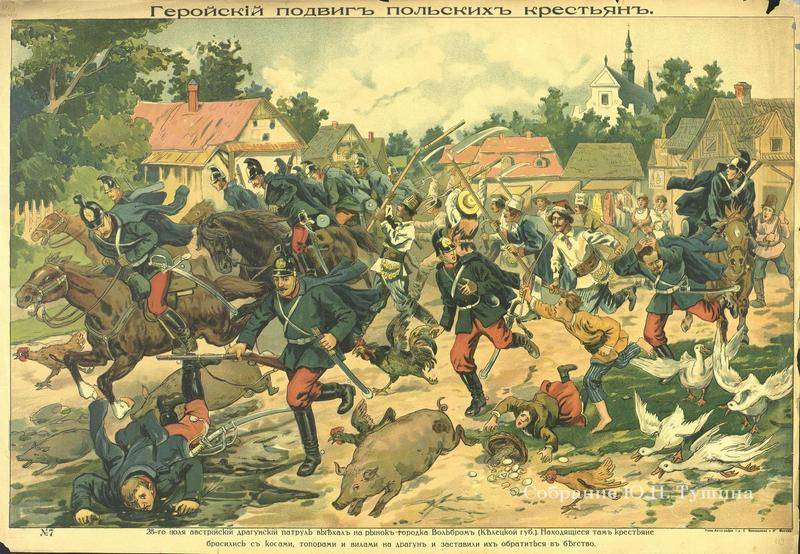
Perhaps loyalty to Russia, literally permeating the programmatic work of Roman Dmovsky “Germany, Russia and the Polish Question”, was caused by Germany’s rude and awkward policy: what the 1904 law of the year was against the parcel of Polish land ownership, which deprived the vast majority of impoverished Polish peasants of last chance get land And the law on the alienation of Polish lands, adopted by the Prussian Landtag later, in 1908, only once again confirmed the author’s correctness.
Polish Kolo in the Duma was silent ...
And yet, when the revolutionary wave subsided, from about the year 1908, a very short epoch of “real politics” began in the Polish question. The Tsar's decree on changing the electoral law (III Duma) said: “The State Duma created to strengthen the Russian state should be Russian and in spirit. Other nations that make up the state should have representatives of their needs in the State Duma, but they should not and will not to be among those who give them the opportunity to be the authorities of purely Russian questions. In the very outskirts of the state where the population has not achieved sufficient development of citizenship, elections to the State Duma should be temporarily suspended "(2).
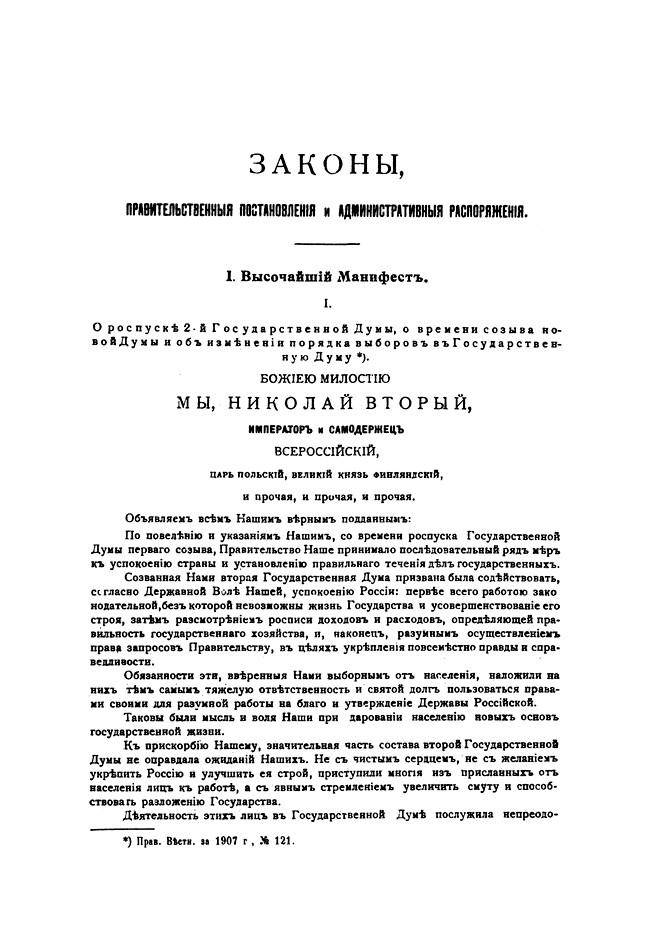
Having shrunk more than tripled, the Polish faction in the III State Duma abandoned the course towards autonomy, realizing that this threatened to simply be forcibly expelled from the parliamentary rostrum. The deputy from the Warsaw province, Vladislav Grabski, publishes Memorial with the rejection of the requirement of autonomy, which was supported by all 11 members of Kolo and deputies from the western provinces.
Loyalty to the main activities of the Stolypin government promised the Poles more concrete prospects than cooperation with weakened opposition factions. Even in the Third Duma, they were ready to support the most radical Polish demands. Grabsky’s optimal tactics seemed to be the consistent introduction of self-government, like throughout the empire, a reduction in land and city tax rates, the restoration of the rights of the Polish language, and only then the participation of the Kingdom in cultural events funded from the treasury. This will prepare the ground for autonomy.
Having missed a chance for autonomy, which, in their opinion, was given by the First Russian Revolution, the most sober-minded Polish politicians admitted: “The current political situation in the Russian state undoubtedly favors the implementation of any plans crushing the established pattern in Polish-Russian relations and if on the one hand, the case of the autonomy of the Kingdom of Poland, did not go beyond the scope of the possibility, on the other hand, putting it on line could affect the final decision of the government on the issue of division of Kholmskaya Rus "(3).
It was at this time that Roman Dmovsky released his program book (4), which made such a strong impression on Nicholas II. A bit later the sobering public speeches of Korwin-Milevsky (5) were made. At the same time, the Polish Kolo in the Duma, although not numerous, entered into a very effective alliance with the Octobrists, quickly conducting a bill in favor of the Polish language at teacher seminars in the Kholm region. However, immediately a conflict broke out between the allies on the issue of the Orthodox school, which the nationalists wanted to see only "Russian", despite the fact that more than half of the students of the Russian language almost did not know.
The closure in the Kholm region of the Polish cultural and educational society "Matitsa", which instead of strengthening the Slavic unity conducted the poorly concealed polonization of the Russian and Ukrainian population of the region, caused real hysteria among frank polonophiles and Polish nationalists. "New time" in response immediately asked the question: "And after that, someone else may have doubts about the need to allocate Kholmshchina?" At the same time, she dared to harshly criticize the authorities: "In the ruling circles, they are still thinking about the bad configuration of the Kholm province (6)." But the Polish colo in the Duma was silent ...
The configuration of the Kholmsk province today worries many, although not in Russia
Kolo was powerless when the nationalists again initiated questions about the allocation of Kholmshchina, as well as anti-Polish restrictions in the legislation on Western zemstvo. The fact that they were not promptly resolved during the "time of the real politician" can in no way be considered the merit of the Polish deputies, but rather should be attributed to the remnants of the ordinary Russian bureaucracy. The Polish faction supported Stolypin's agrarian reform, but did not gain the confidence of the new prime minister. Moreover, the Poles did not even get an audience with him, after which the leader of the National Democrats and the Polish Kolo Roman Dmovsky left the Duma. In the next IV Duma, the Polish Kolo already and together with its allies numbered only 13 members. Dmovsky lost the election, Grabsky himself decided to leave the Russian parliament, and as a result, Kolo went into the shadows, having to “swallow” the loss of Holm region shortly before the World War.
Western zemstvo on the Russian land
In order to weaken even hints of the Polish opposition, Stolypin promoted the Kholm project as a “package” along with a plan for introducing local and municipal self-government in the Polish territories. According to Stolypin himself, it could not but be "Polish in essence." In this case, the allocation of "Russian Kholmshchiny" would look more reasonable. But the decision on the question of the western zemstvo, which, according to Stolypin's plan, was to play the role of a peculiar catalyst for the Kholm problem, in fact turned out to be more difficult and hardly cost the prime minister his post. And the completion of the legislative epic was truly dramatic.
In support of the project again decided to use statistics. Survey data should have provided another “legitimate” rationale for the selection idea. At the same time, it cannot be excluded that they were deliberately corrected in order to enhance the “effect”, to create the impression of a truly critical situation and thereby thereby exacerbate the need for isolation. According to the Synod and the government commission, only in the period from past research, to 250, thousands of people in the Lublin and Sedlets gubernias converted to Catholicism, although more realistic estimates said that there could not be more than 150 thousands, otherwise from the ranks of the flock Orthodox bishop Eulogius?
Two more digits also had to “frighten” lawmakers - ostensibly in the Lublin province only 12,3 percent of Orthodox remained, and in Sedletskaya - 12 percent. In this case, it is very difficult to understand who in this case the Moscow Patriarchate was to rely on in the new Kholm province. Even if all the Lublin and Sodletsk Orthodox are “resettled” or even “rewritten” in Kholmshchina, you will not get the majority.
Count V. Tyszkiewicz, the leader of “real politicians,” immediately through the Cadet Rech described the idea of Stolypin as an attempt to “turn the fourth section of Poland” (7). In support of Tyszkiewicz, Boleslaw Prus, a participant in the Polish uprising 1863-64, frantically and fiercely spoke, himself a native of Hrubieszów (Hrubieszów), not far from Lublin and from the Hill. "Kholmshchina is the Polish land, our land, our property."
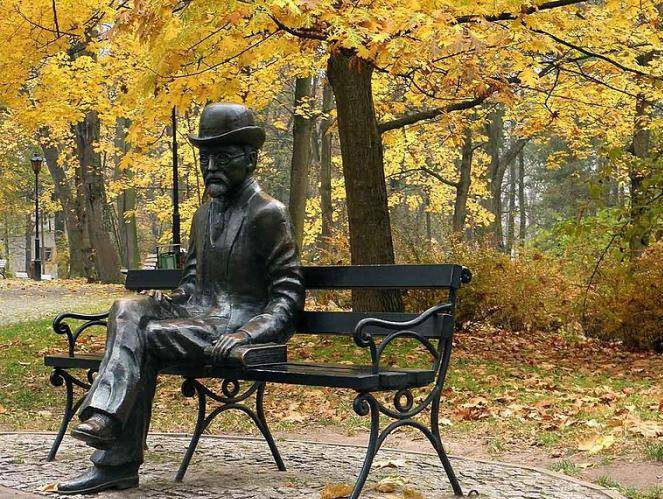
Many people know the monument to the great writer in Warsaw, and on this “bench” in the quiet Naleczów, he was seated only in 2009 year.
Expanding Stolypin’s plans to link the issue of Polish self-government with the Kholmshchyna separation plan, he continued: “When performing vivisection of a living region, the bureaucracy takes care of compensation, gives concessions to the Poles on the principle:" do ut des. "Prus called this thought shameful: we want it, we, and ourselves at auction, and we will not sell at retail. ”The same Cadet Rech published the sermon of a great writer, highlighting that, in addition to Prus, Henryk Sienkiewicz called on the Polish Deputies to the First Duma” lie on the threshold to prevent hollowness of the hill area (8).
The 1910 decree on non-profit organizations, immediately called Stolypin’s, said: they ... "undoubtedly lead to a deepening of the principles of national isolation, discord, and therefore should be recognized as threatening public peace and security." March March 20, IP Balashov wrote Stolypin: "It is this nature of your activity that gave you charm and strength" (1911).
Recall that in the project of the Western Zemstvo for centuries the principle of estate that prevailed in the empire was sacrificed by narrow national politics. According to the scheme proposed by the government, the peasants were simply allocated 1 / 3 places, and for the rest of the estates two curias were formed - Polish and Russian. The number of nominees to Zemstvo Councils was determined on the basis of a peculiar estimate, approximately, as the arithmetic average between the population and the value of real estate belonging to this national group of voters. As a result, by definition, G.E. Lviv "estate was an obstacle to the proper development of rural affairs".
Practically all the projects of the "Western Zemstvo" relied on the election by qualification - property and land. The first one, which came out of the walls of the Ministry of the Interior, did not provide for the highest property qualification, but was so tough in other parameters that it almost immediately cut off about seven thousand Russian voters in six western gubernias. The project of the Ministry of Internal Affairs entered the State Council in May 1910 of the year, until January 1911 of the year was twice considered by the Special Commission and twice rejected. Moreover, it was rejected, despite the fact that the special examination submitted to the State Council indicated the special composition of the Russian population of the western provinces. The prospect of infringing upon the interests of the Russian population looked very real, bearing in mind the unconditional fact that in Poland the Russians, not even peasants, are for the most part much poorer than the Poles.
What kind of curia, the Creator?
During the discussion, as, incidentally, and subsequently, the issue of national curiae became perhaps the most important one in the entire project. At the same time, some politicians suggested not to divide the western provinces into curias at all, so as not to aggravate relations with the Poles. Thus, a large landowner Khomenko, a member of the State Council, one of the few Russian rich people in Polish lands, said that the division into curias would only exacerbate contradictions, if you do not trust Polish landowners, it is better not to allow them to be elected (10). Monarchists remained convinced that “to introduce even fictitious electoral self-government would be inappropriate” (11). Senator Zinoviev noted that "Russian land ownership in the region is almost all paper, therefore, there is no suitable element for the zemstvo" (12). And the peasants will fall under the influence of Polish landlords simply by virtue of their economic dependence on them.
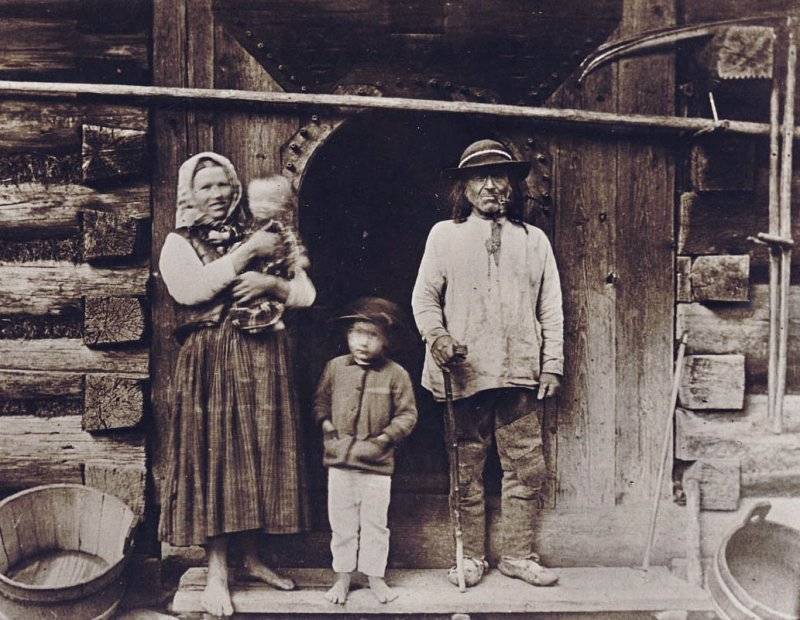
The center group, led by Prince PN Trubetskoy also opposed the division of Holland’s voters into curias, but for other reasons, considering the Russian peasantry to be a reliable support in defending their interests - that is, in fact, an anti-Polish factor (13). Former Prime Minister Sergei Witte also considered the peasants the most reliable element after the Russian landowners and spoke in favor of increasing their number among the zemstvos. The idea of Stolypin that the curia would eliminate the "alien" influence in the zemstvo, Witte considered it a "deep delusion" (14).
Relying on the centrists, Tröpov and Durnovo — Stolypin’s personal rivals, skillfully inclined the right-wing members of the State Council against the draft, who, based on the experience of the State Duma elections, doubted the policy of betting on the unculture of the peasantry, which could be used by large landowners for political purposes. However, the prime minister, despite the unexpected demand of a group of landowners in the Minsk province “not to impose pockets of a strange infection (curia),” retained surprising self-confidence. Stolypin did not consider it necessary even to oblige five ministers - members of the State Council to participate in the consideration of the draft, despite the fact that the question was not adopted at the third session of the State Council 1910 of the year.
4 March 1911, the 92 State Council voted against 68 to reject the idea of creating a national "curia", an immediate response to which was Stolypin’s resignation statement. Nicholas II, as many expected, did not accept the resignation of the prime minister, in effect giving him the right to set his own conditions. Already 9 in March, Stolypin demands in writing from the emperor as much as dissolving the State Council and the State Duma for three days in order to pass a bill on a western zemstvo according to the 87 article of the laws of the Russian Empire. Moreover, the Prime Minister proposes to send on vacation until January 1 1912, Durnovo and Trepov and allow him to form the State Council by ½.
Stolypin’s tough stance has become an additional irritant for the State Council members who are traditionally loyal to the government. On the final vote on the draft western zemstvo 11 in March, senators rejected it on all counts. But Nicholas II showed an enviable hardness in response and immediately dismissed the State Duma and the State Council until March 15 - in strict accordance with the requirements of his prime minister. At the same time, the king signed a decree on the introduction of a western zemstvo, after which the then State Council Chairman MG Akimov hurried to him in Tsarskoye Selo. Of course, he did not achieve anything from the emperor, except for the message that Trёpov and Durnovo were sent on vacation - again, in full accordance with Stolypin’s proposals.
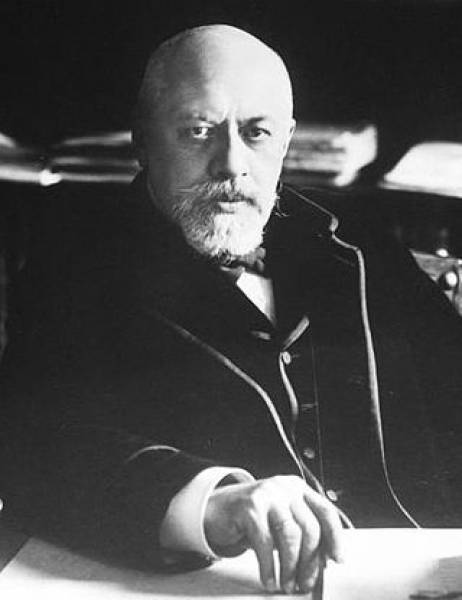
Mikhail G. Akimov - Chairman of the State Council of the Russian Empire 1907-1914
March 14 Tröpov was completely sent out to the king by resignation, and after him a significant part of the State Council members. Of the large figures, only Witte was not touched, and even then, only because Stolypin was able to convince Nicholas II of unfavorable international resonance. This important bill for the Prime Minister, an integral part of his reform program, has already been approved by the State Duma. More unexpected was the failure of the bill in the State Council. Contemporaries recalled that when the results of the voting were announced, Stolypin died deadly and left the hall of the State Council meeting without saying a word. He understood that they were talking about dissatisfaction with the entire political course, and expressed from the height of the throne - Durnovo and Tröpov obviously acted with the approval of Nicholas II.
However, he still did not dare to part with the Prime Minister, especially since his mother intervened in the matter - the widowed empress Maria Feodorovna. She saw in Stolypin the guarantor of the preservation of the throne for her son. Eyewitnesses said that Stolypin collided with Nicholas on the threshold of the dowager empress's office, and the king, with his eyes lowered, slipped past Stolypin, like a schoolboy. And only the next day, from the newspapers the main opponents of the prime minister learned that they were dismissed on indefinite leave by their own request ... A very characteristic style for the last emperor.
The ministerial crisis seems to have ended with Stolypin’s triumph, but this was truly a Pyrrhic victory. Stolypin lost support even from the Octobrists, who did not forgive the premiere of open disregard for the activities of the Duma and the State Council. Chairman III State Duma A.I. Guchkov, before Stolypin’s supporter, resigned and was replaced by M.V. Rodzianko.
And Nicholas II, an autocrat, actually forced to submit to the prime minister’s ultimatum, immediately lost interest in him: unlike his mother, he easily changed his attitude towards people. In the court circles began talking that the days of Stolypin as prime minister are numbered. S.Y. Witte, who was retired, wrote, not without malice about the near sunset of his rival's career: "... at one of the reports, the sovereign at the end of the report told him:" And for you, Peter Arkadyevich, I am preparing a new appointment "(15).
For some reason, the archives did not save decent photos of the last emperor next to the great prime minister.
Strange, but having received rather dubious evidence that, after such difficulties with the Zemstvo law, the Kholmsky project itself “will pass under all circumstances,” the rightists very lightly reacted to the voting procedure of a number of its specific articles in the Duma. As a result, the seemingly foreshadowed question of the allocation of territories of the Kholm province from the Warsaw General Governorship, that is only one, 10, the head of the Kholm project, did not work out as a result of the so-called random vote. With 138 votes “against”, dominated by the Cadets and members of the Polish Kolo, only 126 gained votes “in favor”.
In an effort to immediately "replay" the question, the right demanded a re-vote, and the Duma presidium insisted on a half-open vote by going through different doors - right and left. But here, the vanity of so many deputies who ignored the first vote leaped. A group of left Octobrists, always loyal Baltic landowners and even a few Muslims, joined the Cadets and Kolo.
It seems that all of them at some point "tried on" the Holland question for themselves. Re-voting was again secret, and the balance of votes not in favor of the allocation was even more crushing. As soon as he was announced, Bishop Eulogius turned pale and almost fainted, while the presiding Chikhachev sat all red, silently turning over the papers on the table. The Octobrists still tried to make a good face out of a bad game, proposing a conciliatory formula for the allocation of Holland not from the Kingdom, but from the Governor-General for the entire project as a whole, but it was too late. As a result, the project almost went to the State Council unvoted in the Duma.
Notes
1. R. Dmovskiy, Germany, Russia and the Polish Question. SPb., 1908, p. 273.
2. “Russia”, 1907, 3 June, №466.
3. “Taine dokumenty rosijski o niezbedosci wulaczenia Rusi Chelmskiej”, Lublin, 1906.
4. R. Dmovskiy, Germany, Russia and the Polish Question. SPb., 1908.
5. The voice of a Polish nobleman, St. Petersburg., 1909, What should the Lithuanian nobility strive for?
6. New time, 1908, №132082 from January 2.
7. Kholmskaya Rus and the Poles, Rech, 1906, 28 December.
8. Y.Clemenc, Boleslav Prus, “Rech”, 1909, No.229, 22 August.
9. Red Archive, No.2 (9), p .292.
10. TsGIAL, f. State Council, session 1 / 154, General meeting of the TOS, January 16-20 meeting, 1911, L.NUMX, Dissenting opinion of State Councilor V.I. Khomenko.
11. In the same place, l.105, p.75-84, Dissenting opinion of State Councilor N.A. Zinoviev.
12. Stenographic Report of the State Council, Session VI, January 28 meeting, 1911, page 953.
13. TsGIAL, f. State Council, sp.1 / 154, General meeting of the TOS, meeting 16-20 January 1911, Dissenting opinion of members of the State Council of the book. Pn Trubetskoy, V.I. Khomenko, gr. ON. Bobrinsky, N.P. Balashov.
14. Stenographic Report of the State Council, Session VI, January 28 meeting, 1911, page 927-935.
15. S.Y. Witte, Memories. M., 1960, t.3, p.559.
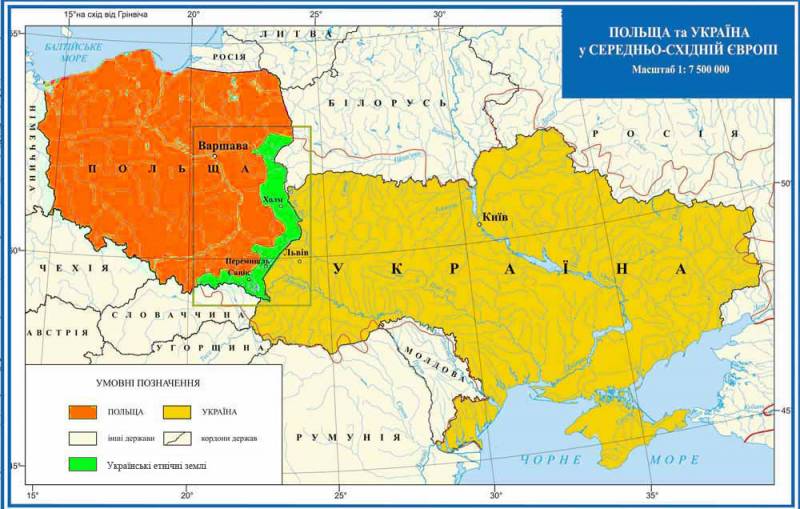
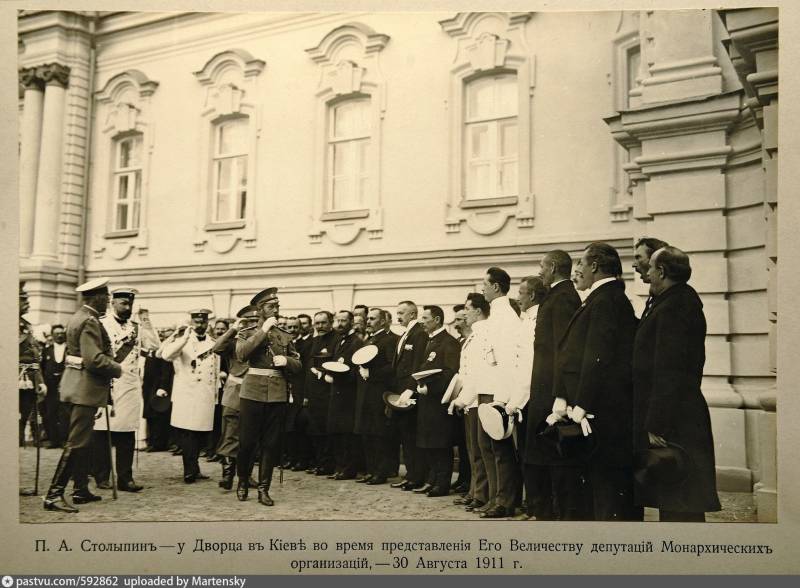
Information